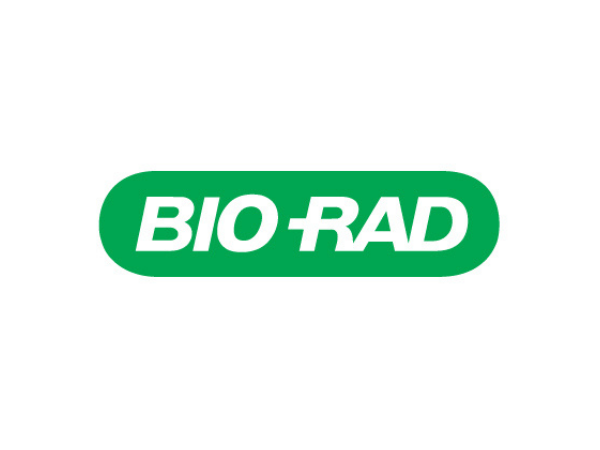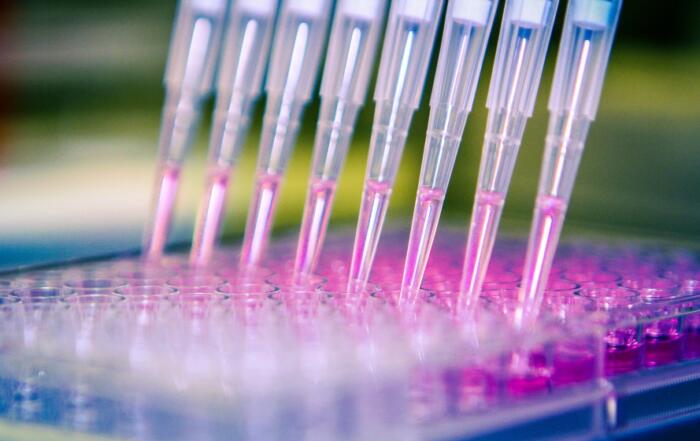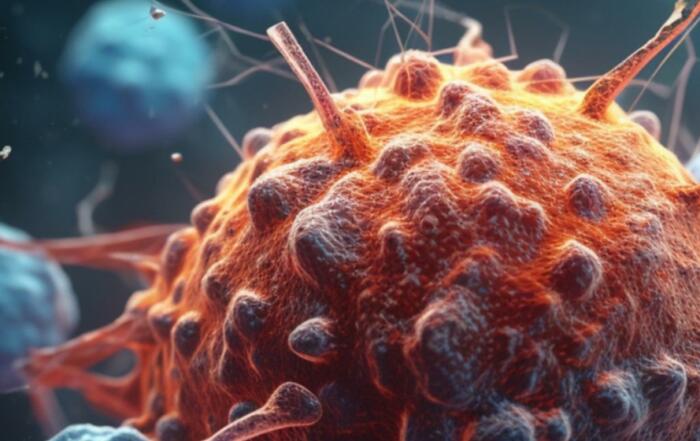In this webinar, Dr. Paul Royle from Bio-Rad’s antibody division discusses recombinant antibody generation, guided selection strategies, SpyTag technology, and TrailBlazer antibodies to combat common bioanalytical assay development challenges. Dr. Royle also provides detailed examples of how different antibody formats can be used in a variety of bioanalytical assay applications.
Highlights
- Recombinant antibody generation using human combinatorial antibody libraries (HuCAL)
- Guided selection strategies to generate antibodies specific to different types of biologics
- Rapid format switching and conjugation with SpyTag technology
- TrailBlazer antibodies as critical reagents for assay development
- Antibody formats for a variety of bioanalytical assay applications
Webinar Summary
Multiple challenges exist in bioanalytical assay development, from antibody generation to quality control. A researcher must first decide if an analyte will be measured in all or only certain desired forms, identify the sample types or matrices in which it will be measured, and identify the appropriate sensitivity and specificity required of their assay. The role of the antibody (i.e., capture, detection, or reagent), as well as its required format, must also be identified. Lastly, the generated antibodies must be characterized and validated in terms of supply continuity, robustness, reproducibility, and stability. In this webinar, Dr. Royle addresses these challenges and discusses specific antibody generation using Bio-Rad’s HuCAL technology, format flexibility offered by SpyTag technology, antibody formats for different bioanalytical assays, and quality and performance of Bio-Rad antibody products.
Antibody specificity refers to how well a given antibody can discriminate between its target antigen and similar antigens present in the sample matrix. Using the antibody phage display method of antibody generation, Bio-Rad is able to control specificity in a way that would be difficult to achieve with a traditional animal-based immunization method. Bio-Rad offers a synthetic library of 45 billion fully human antibodies in fragment of antigen binding (Fab) format. HuCAL is a compilation of human antibody genes that encompass more than 95% of the structural human immune repertoire, cloned in Escherichia coli (E. coli) phagemid vectors. Bio-Rad also offers anti-idiotype antibodies to researchers developing therapeutic drugs who need to measure drug antibody titers in human serum. Dr. Royle notes that the therapeutic can be difficult to measure in serum, as its concentration can be up to one million times lower than a patient’s own antibody.
“You’re looking for a human antibody in a very high background of human antibody, so it’s a bit like a needle in a haystack, and it can be difficult to use physical chemistry methods to discriminate between the drug antibody and the patient’s own antibody.”
Custom anti-idiotype antibodies that recognize unique features on the drug antibody can be generated with different library screening strategies. Type 1 anti-idiotypes bind only to the drug antibody’s binding site, thus providing the researcher with a positive control to simulate an immune response to that drug antibody. Type 2 anti-idiotypes are used when the drug target is present in solution and forms a complex with the drug antibody. These anti-idiotypes alternatingly enrich between the free and complex forms of the drug antibody so that it may be recognized regardless of its form, and the total drug can be measured in serum. Lastly, type 3 anti-idiotypes will only measure drug antibodies in complex with the drug target.
“What we can usually provide a customer with is a complete toolbox so that they can measure free, total, and complex-bound drugs.”
Not all antibodies, however, are for ligand binding assays; sometimes researchers require functional antibodies. Dr. Royle provides an example in which a researcher needed neutralizing antibodies to West Nile virus protease. HuCAL technology was used to isolate antibodies specific to the NS2B-NS3 protease complex active site with phage display blocking strategies. Rather than generating hundreds of protease clones and assessing them individually to find one specific to the active site, Bio-Rad stringently depleted their library for all antibodies to all epitopes on the protease except those in the active site.
Dr. Royle further reviews antibody formats historically offered by Bio-Rad, as well as new technology available for researchers. While Bio-Rad traditionally offered antibodies in E. coli or full-length immunoglobulin G (IgG) formats, their new antibody standard is the SpyTag format based on Streptococcus pyogenes fibronectin-binding protein. Complementary SpyCatcher domains are available to researchers in multiple formats, including monovalent, bivalent, and IgG-like. The SpyTag technology can be combined with BioRad’s HuCAL recombinant antibody generation service to produce TrailBlazer antibodies, enabling the rapid development of robust bioanalytical assays. During a given project, Bio-Rad can generate 15-20 clones for a researcher and provide these clones in one or multiple formats through a series of fusion reactions. For example, a researcher may desire the monovalent format for affinity measurements, a conjugated bivalent format for sandwich pair analysis, or a human IgG format for an anti-drug antibody (ADA)-ligand binding assay.
“Say we generate 15 antibodies in the course of the project. [The researcher] can receive all 15 antibodies in each of the three formats, so they’d get 45 antibodies together, and they can evaluate all of those clones in different assays as a way of rapid prototyping to see which are best for which particular application.”
Dr. Royle also notes that many researchers require antibodies for pharmacokinetic (PK) assays or ADA assays. In the case of PK bridging enzyme linked immunosorbent assays (ELISAs), Bio-Rad provides researchers with a monovalent format for coating, while a bivalent, labeled domain is typically used for detection; such SpyCatcher domains yield similar performance characteristics compared to traditional IgG. Researchers who have developed new drug molecules will usually lack a human serum sample in which an immune response has been generated to their drug. For these applications, researchers often ask Bio-Rad to generate ADAs as controls to simulate an immune response. Dr. Royle provides an example of rapid prototyping with SpyTag technology in comparison to antibodies subcloned into a mammalian expression vector made in the traditional way; performance of low, medium, and high affinity ADAs compared well across SpyCatcher and IgG formats. In addition to ELISA applications, Bio-Rad offers affinity and off-rate ranking, sandwich pair selection, flow cytometry, and western blotting.
Site-specific conjugation of SpyTag formats leads to better assay performance, as demonstrated by Dr. Royle. SpyCatcher domains are prelabeled before the Fab is added, so there is no danger of incorporating the label into the Fab, which would compromise antibody binding. Versions including one or three cysteine labels per capture are available from Bio-Rad, and so the researcher can choose the degree of labeling and have confidence that there is high batch-to-batch consistency. Therefore, researchers know that any variation observed is due to the antibody’s binding characteristics rather than the degree of labeling. In contrast, for mouse hybridoma projects in which clones are directly labeled with primary amines, there will be two areas of variability: the antibodies and bound targets, and clone-to-clone labeling. Because SpyCapture domains are prelabeled, the latter variability is mitigated.
“[Site-specific conjugation] really helps you narrow down exactly what you’re looking at to the performance characteristic.”
Assuming the generated antibodies are specific to the desired target antigen and in the correct format for the assays in which they will be used, the antibodies must lastly be assessed for quality and performance. While a researcher can choose to keep all batches prepared by Bio-Rad, they can also elect to have Bio-Rad hold a batch as an in-house reference for any subsequent batches they may produce. In-house controls can demonstrate very high reproducibility and be included in the supporting data provided with the antibody product. Dr. Royle also discusses the high stability of Bio-Rad antibodies by subjecting them to heat stressing conditions; antibodies stored at 20°C for four weeks performed similarly to control antibodies stored at the usual -80°C.
In conclusion, the TrailBlazer antibodies offered by Bio-Rad can address the challenges of bioanalytical assay development. Bio-Rad is able to generate custom antibodies to suit a researcher’s desired, proprietary biologic and achieve a desired specificity and binding mode. The researcher has access to multiple formats for testing, and the recombinant antibodies that are generated have a high batch-to-batch consistency and long-term secure supply throughout the assay lifecycle.
Resources
Q&A
- What is the time and cost to develop a unique antibody?
- Do you have services to express antibodies in SpyTag or different formats with known sequences?
- When do you think your SpyCatcher horseradish peroxidase format will be available?
- Can the SpyCatcher system be used for functional assays?
- Can you develop antibodies against a peptide instead of regular proteins?
- Do you offer characterization of antibodies?
- Have you encountered any differences in performance when switching between formats?
- Do you also construct nanobodies?
- Will we get the construct plasmids for the antibody you generated with the SpyTag or other formats?
Presenters
Technical Sales Manager
Custom Antibodies
Bio-Rad








